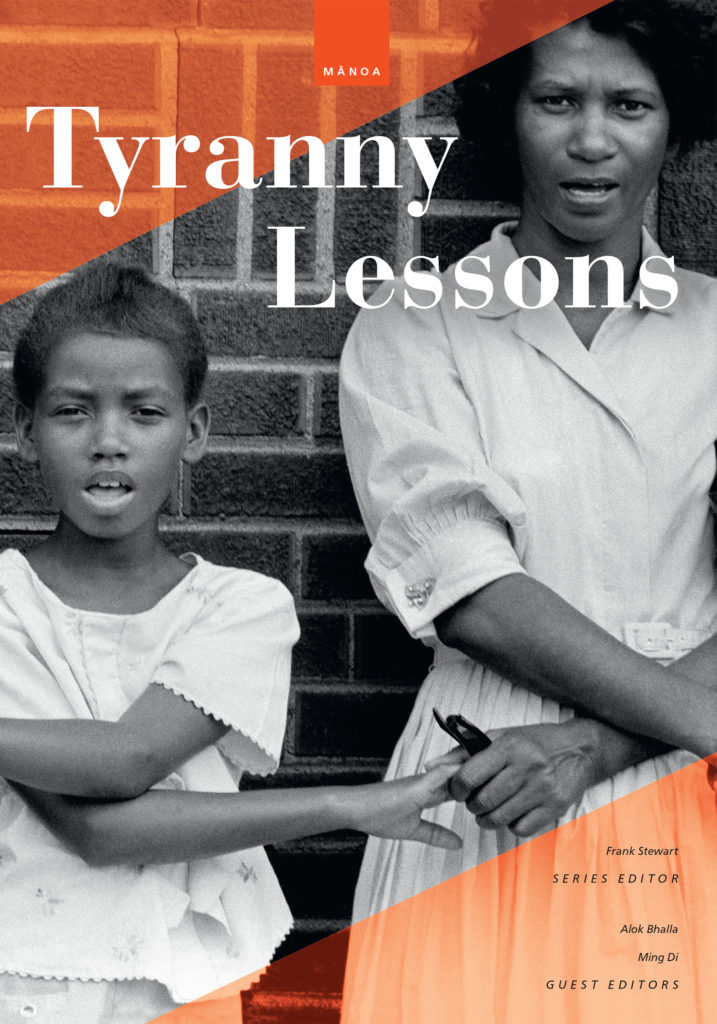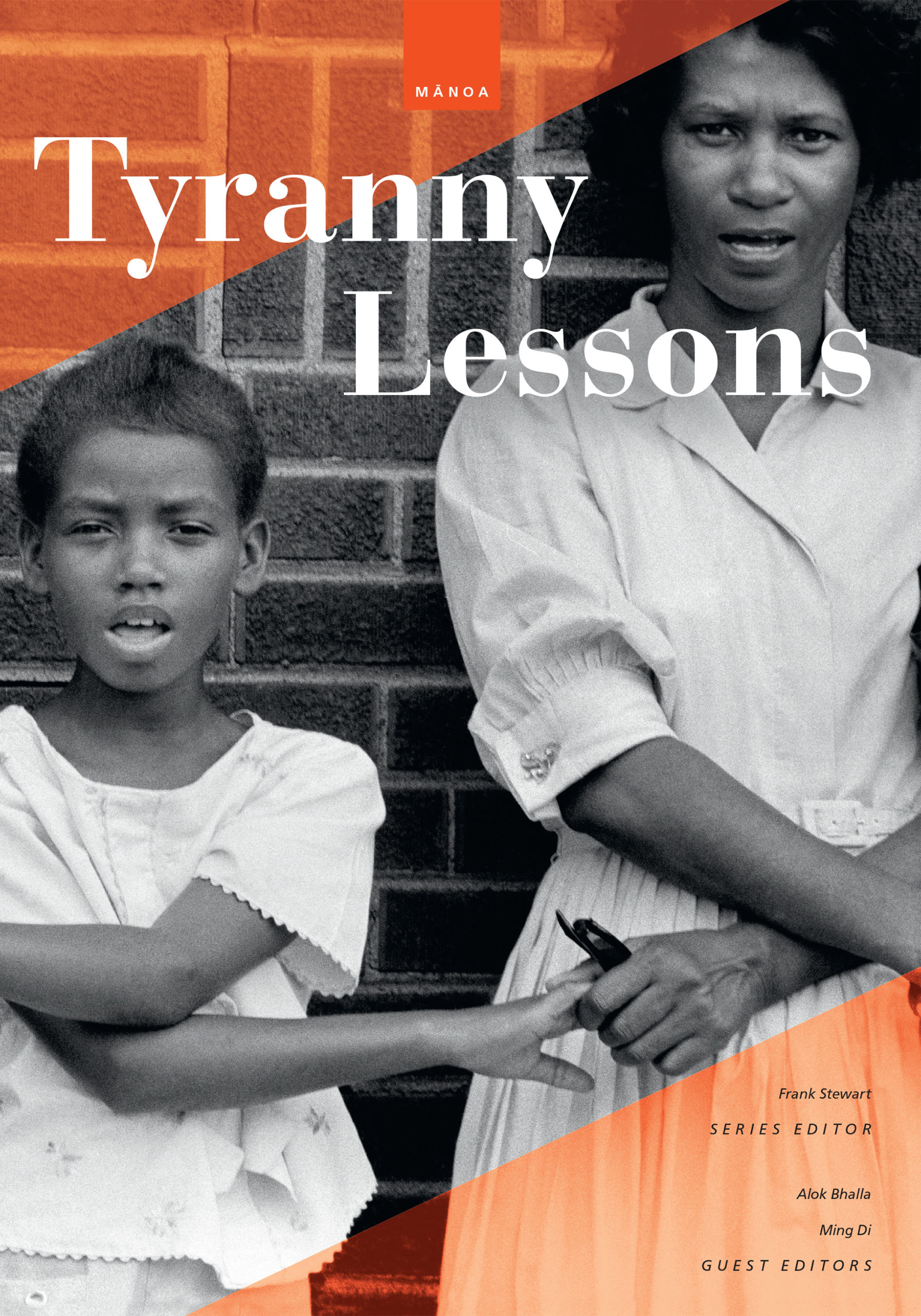In Tyranny Lessons, the newest volume from MĀNOA, international writers from two dozen countries in Asia, the Middle East, Europe, and the Americas address the challenges of contemporary tyranny as only literary writing can: through the perspective of lived experiences, imagined futures, and personal struggles.
Tyranny Lessons also features the photography of Danny Lyon, the first photographer of the Student Non-violent Coordinating Committee, whose work documented the Civil Rights movement in the 1960s.
Alok Bhalla and Ming Di guest edited this issue alongside MĀNOA editor Frank Stewart, who shares how this issue came together and some of the pieces in the issue.
University of Hawai‘i Press: Tell us how this special issue came together.
MĀNOA: As an international literary publication, MĀNOA tries to engage with the most urgent issues of our time. We have compiled volumes on freedom, unending wars, reconciliation, and, most recently the displacement of people due to climate change, ethnic conflicts, and other causes. Tyranny Lessons grew out of these global concerns.
UHP: Why is this issue important now?
MĀNOA: Literary writing is often about individuals, not statistics or abstract groups. Many millions of people have been displaced around the world, and tens of millions are living under authoritarian governments or in intolerant communities. These numbers blur the fact that they comprise individuals, each of whom struggles, suffers, or is hurt. Good literature helps us live through the experiences of everyday people in difficult circumstances, enlarging our understanding and compassion.
UHP: How do you see this issue being used in the world?
MĀNOA: Writers from nearly two dozen countries contributed to this volume—many from places that Americans seldom hear from: India, Indonesia, Tibet, Latvia, Slovenia, Estonia, the Czech Republic, Syria, and others. Their experiences, languages, and viewpoints are diverse. When American readers see them side-by-side in MĀNOA—and when the writers themselves see their work in this international context, across political and national boundaries—lives of others become more immediate, and our feelings of kinship grow larger and more inclusive.
UHP: Walk us through your table of contents: What’s not to miss?
MĀNOA: Well, there are more than sixty writers in the volume so it’s hard to answer this briefly. There are many excellent writers from the PRC, Hong Kong, and Tibet. Tang Danhong’s “Chairman Mao Is Dead!” is a wonderful, acerbic, and at times funny essay about a time in her childhood when a death in China turned the country, and her life, on its head. Other writers from China recall events in the recent past, the outbreak of the COVID-19 virus. There are two wonderful allegorical tales by an Indonesian writer, Rio Johan, living in Paris. There are some unexpected pieces, such as an essay by Walter White, who headed the NAACP, on lynching, and some union songs by Joe Hill.
UHP: What was the most challenging thing about creating this issue?
MĀNOA: It was important to us that Tyranny Lessons not have an agenda or or be predictable. We wanted to understand tyranny as a condition that is common in our lives, in ways we don’t think about in that way—and not just government oppression. There’s a moving story in the issue by Ann Pancake, who lives in West Virginia, about a brother whose opioid addiction tyrannizes the well-being of a family. An essay by Thomas Farber comments on the scientific practice of capturing and experimenting on dolphins—surely an example of humans tyrannizing non-humans. And there’s a fine play by Catherine Filloux, “whatdoesfreemean,” concerning incarcerated women of color.
UHP: How does the artwork complement the written content?
MĀNOA: Acclaimed photographer Danny Lyon, the first official photographer of the Civil Rights Movement, gave us a suite of photographs from his book The Movement: Documentary of a Struggle for Equality. The images underscore the reality that tyranny is not something that happens only in totalitarian foreign countries. Communal violence and intolerance are present in the U.S. as well. And Americans too have lessons to teach the world about tyranny.

Tyranny Lessons
Read Free on Project MUSE:
Poem: “Cry Out in Sorrow,” by Lin Zi
This poem was written for Li Wenliang (1986–2020), the Wuhan doctor who alerted his colleagues about the coronavirus in December 2019, and died of the disease in February 2020. When punished by the police for “spreading rumors,” he said, “A healthy society should allow more than one voice.” The poem calls for public mourning as a protest against censorship.
Buy the Volume
Print copy of Tyranny Lessons, $25
eBook of Tyranny Lessons, $9.99 (through Oct. 2020)
Amazon
Google Play
eBooks.com
Subscribe to MĀNOA
Like Tyranny Lessons? MĀNOA publishes two compelling issues annually of international literature. Subscribe here.





